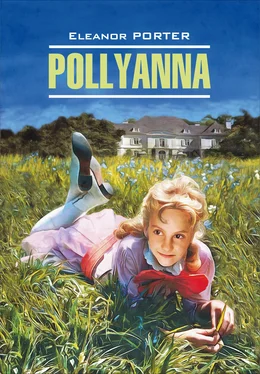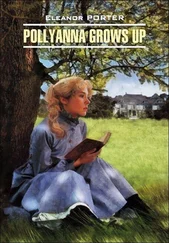“Well, we’ve heard now that she’s fretting her poor little life out of her, because she can’t play it no more – that there’s nothing to be glad about. And that’s what I came to tell her to-day – that maybe she can be a little glad for us, ’cause we’ve decided to stick to each other [185] to stick to each other – ( разг. ) держаться вместе (не разводиться)
, and play the game ourselves. I knew she would be glad, because she used to feel kind of bad – at things we said, sometimes. Just how the game is going to help us, I can’t say that I exactly see, yet; but maybe ’twill. Anyhow, we’re going to try – ’cause she wanted us to. Will you tell her?”
“Yes, I will tell her,” promised Miss Polly, a little faintly. Then, with sudden impulse, she stepped forward and held out her hand. “And thank you for coming, Mrs. Payson,” she said simply.
The defiant chin fell. The lips above it trembled visibly. With an incoherently mumbled something, Mrs. Payson blindly clutched at the outstretched hand, turned, and fled.
The door had scarcely closed behind her before Miss Polly was confronting Nancy in the kitchen.
“Nancy!”
Miss Polly spoke sharply. The series of puzzling, disconcerting visits of the last few days, culminating as they had in the extraordinary experience of the afternoon, had strained her nerves to the snapping point [186] had strained her nerves to the snapping point – ( разг. ) натянули ее нервы до предела; подвели ее к точке кипения
. Not since Miss Pollyanna’s accident had Nancy heard her mistress speak so sternly.
“Nancy, WILL you tell me what this absurd ‘game’ is that the whole town seems to be babbling about? And what, please, has my niece to do with it? WHY does everybody, from Milly Snow to Mrs. Tom Payson, send word to her that they’re ‘playing it’? As near as I can judge, half the town are putting on blue ribbons [187] are putting on blue ribbons – ( разг. ) стали трезвенниками
, or stopping family quarrels, or learning to like something they never liked before, and all because of Pollyanna. I tried to ask the child herself about it, but I can’t seem to make much headway, and of course I don’t like to worry her – now. But from something I heard her say to you last night, I should judge you were one of them, too. Now WILL you tell me what it all means?”
To Miss Polly’s surprise and dismay, Nancy burst into tears.
“It means that ever since last June that blessed child has jest been makin’ the whole town glad, an’ now they’re turnin’ ’round an’ tryin’ ter make her a little glad, too.”
“Glad of what?”
“Just glad! That’s the game.”
Miss Polly actually stamped her foot.
“There you go like all the rest [188] There you go like all the rest – ( разг. ) Это я уже слышала (ты повторяешь то же, что и весь город)
, Nancy. What game?”
Nancy lifted her chin. She faced her mistress and looked her squarely in the eye.
“I’ll tell ye, ma’am. It’s a game Miss Pollyanna’s father learned her ter play. She got a pair of crutches once in a missionary barrel when she was wantin’ a doll; an’ she cried, of course, like any child would. It seems ’twas then her father told her that there wasn’t ever anythin’ but what there was somethin’ about it that you could be glad about; an’ that she could be glad about them crutches.”
“Glad for – CRUTCHES!” Miss Polly choked back a sob – she was thinking of the helpless little legs on the bed up-stairs.
“Yes’m. That’s what I said, an’ Miss Pollyanna said that’s what she said, too. But he told her she COULD be glad – ’cause she DIDN’t NEED ’em.”
“Oh-h!” cried Miss Polly.
“And after that she said he made a regular game of it – findin’ somethin’ in everythin’ ter be glad about. An’ she said ye could do it, too, and that ye didn’t seem ter mind not havin’ the doll so much, ’cause ye was so glad ye DIDN’t need the crutches. An’ they called it the ‘jest bein’ glad’ game. That’s the game, ma’am. She’s played it ever since.”
“But, how – how – ” Miss Polly came to a helpless pause.
“An’ you’d be surprised ter find how cute it works, ma’am, too,” maintained Nancy, with almost the eagerness of Pollyanna herself. “I wish I could tell ye what a lot she’s done for mother an’ the folks out home. She’s been ter see ’em, ye know, twice, with me. She’s made me glad, too, on such a lot o’ things – little things, an’ big things; an’ it’s made ’em so much easier. For instance, I don’t mind ‘Nancy’ for a name half as much since she told me I could be glad ’twa’n’t ‘Hephzibah.’ An’ there’s Monday mornin’s, too, that I used ter hate so. She’s actually made me glad for Monday mornin’s.”
“Glad – for Monday mornings!”
Nancy laughed.
“I know it does sound nutty, ma’am. But let me tell ye. That blessed lamb found out I hated Monday morn-in’s somethin’ awful [189] hated Monday mornin’s somethin’ awful – ( искаж. ) ненавидела утро понедельника
; an’ what does she up an’ tell me one day but this: ‘Well, anyhow, Nancy, I should think you could be gladder on Monday mornin’ than on any other day in the week, because ’twould be a whole WEEK before you’d have another one!’ An’ I’m blest if I hain’t thought of it ev’ry Monday mornin’ since – an’ it HAS helped, ma’am. It made me laugh, anyhow, ev’ry time I thought of it; an’ laughin’ helps, ye know – it does, it does!”
“But why hasn’t – she told me – the game?” faltered Miss Polly. “Why has she made such a mystery of it, when I asked her?”
Nancy hesitated.
“Beggin’ yer pardon, ma’am, you told her not ter speak of – her father; so she couldn’t tell ye. ’twas her father’s game, ye see.”
Miss Polly bit her lip.
“She wanted ter tell ye, first off [190] first off – ( искаж. ) прямо сразу; с самого начала
,” continued Nancy, a little unsteadily. “She wanted somebody ter play it with, ye know. That’s why I begun it, so she could have some one.”
“And – and – these others?” Miss Polly’s voice shook now.
“Oh, ev’rybody, ’most, knows it now, I guess. Anyhow, I should think they did from the way I’m hearin’ of it ev’rywhere I go. Of course she told a lot, and they told the rest. Them things go, ye know, when they gets started. An’ she was always so smilin’ an’ pleasant ter ev’ry one, an’ so – so jest glad herself all the time, that they couldn’t help knowin’ it, anyhow. Now, since she’s hurt, ev’rybody feels so bad – specially when they heard how bad SHE feels ’cause she can’t find anythin’ ter be glad about. An’ so they’ve been comin’ ev’ry day ter tell her how glad she’s made THEM, hopin’ that’ll help some [191] hopin’ that’ll help some – ( искаж. ) в надежде, что это хоть как-нибудь поможет
. Ye see, she’s always wanted ev’rybody ter play the game with her.”
“Well, I know somebody who’ll play it – now,” choked Miss Polly, as she turned and sped through the kitchen doorway.
Behind her, Nancy stood staring amazedly.
“Well, I’ll believe anythin’ – anythin’ now,” she muttered to herself. “Ye can’t stump me with anythin’ I wouldn’t believe, now – o’ Miss Polly!”
A little later, in Pollyanna’s room, the nurse left Miss Polly and Pollyanna alone together.
Читать дальше
Конец ознакомительного отрывка
Купить книгу












